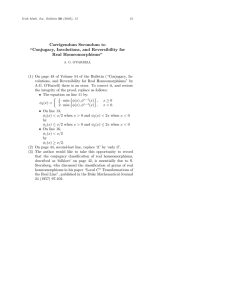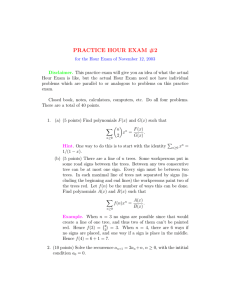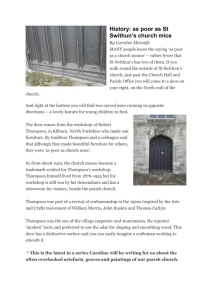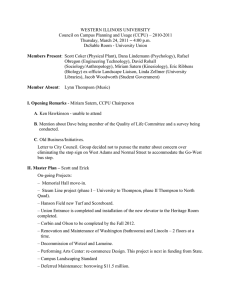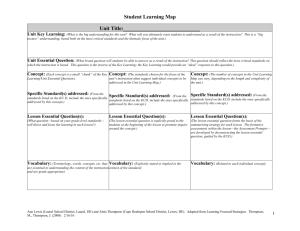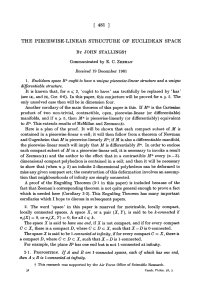Implementation Details From pattern pairs to labeled nV trees
advertisement
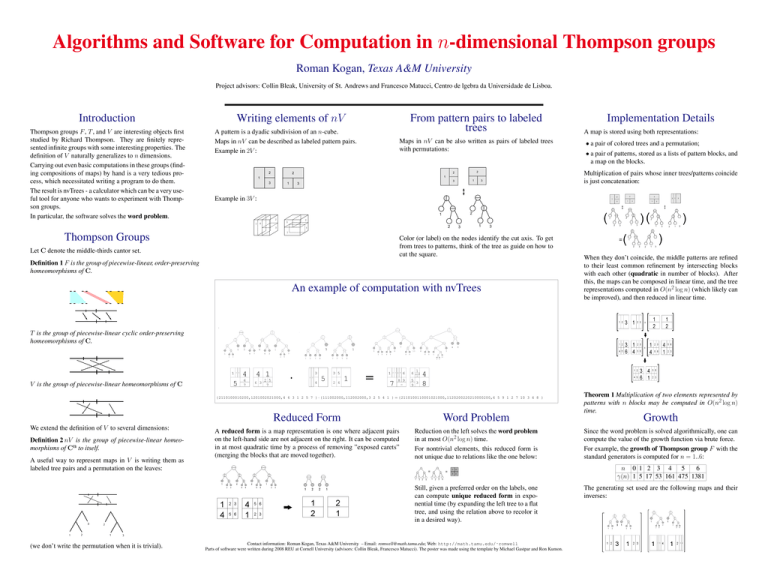
Algorithms and Software for Computation in n-dimensional Thompson groups
Roman Kogan, Texas A&M University
Project advisors: Collin Bleak, University of St. Andrews and Francesco Matucci, Centro de lgebra da Universidade de Lisboa.
Introduction
Thompson groups F , T , and V are interesting objects first
studied by Richard Thompson. They are finitely represented infinite groups with some interesting properties. The
definition of V naturally generalizes to n dimensions.
Carrying out even basic computations in these groups (finding compositions of maps) by hand is a very tedious process, which necessitated writing a program to do them.
The result is nvTrees - a calculator which can be a very useful tool for anyone who wants to experiment with Thompson groups.
In particular, the software solves the word problem.
Writing elements of nV
A pattern is a dyadic subdivision of an n-cube.
Maps in nV can be described as labeled pattern pairs.
Example in 2V :
From pattern pairs to labeled
trees
Maps in nV can be also written as pairs of labeled trees
with permutations:
Implementation Details
A map is stored using both representations:
• a pair of colored trees and a permutation;
• a pair of patterns, stored as a lists of pattern blocks, and
a map on the blocks.
Multiplication of pairs whose inner trees/patterns coincide
is just concatenation:
Example in 3V :
Thompson Groups
Color (or label) on the nodes identify the cut axis. To get
from trees to patterns, think of the tree as guide on how to
cut the square.
Let C denote the middle-thirds cantor set.
Definition 1 F is the group of piecewise-linear, order-preserving
homeomorphisms of C.
An example of computation with nvTrees
When they don’t coincide, the middle patterns are refined
to their least common refinement by intersecting blocks
with each other (quadratic in number of blocks). After
this, the maps can be composed in linear time, and the tree
representations computed in O(n2 log n) (which likely can
be improved), and then reduced in linear time.
T is the group of piecewise-linear cyclic order-preserving
homeomorphisms of C.
V is the group of piecewise-linear homeomorphisms of C
{2110100010200,1201002021000,4 6 3 1 2 5 7 } · {111002000,112002000,3 2 5 4 1 } = {2110100110001021000,1120200220210000200,6 5 9 1 2 7 10 3 4 8 }
We extend the definition of V to several dimensions:
Definition 2 nV is the group of piecewise-linear homeomorphisms of Cn to itself.
A useful way to represent maps in V is writing them as
labeled tree pairs and a permutation on the leaves:
Reduced Form
Word Problem
A reduced form is a map representation is one where adjacent pairs
on the left-hand side are not adjacent on the right. It can be computed
in at most quadratic time by a process of removing ”exposed carets”
(merging the blocks that are moved together).
Reduction on the left solves the word problem
in at most O(n2 log n) time.
For nontrivial elements, this reduced form is
not unique due to relations like the one below:
Growth
Since the word problem is solved algorithmically, one can
compute the value of the growth function via brute force.
For example, the growth of Thompson group F with the
standard generators is computed for n = 1..6:
n 0 1 2 3 4 5
6
γ(n) 1 5 17 53 161 475 1381
Still, given a preferred order on the labels, one
can compute unique reduced form in exponential time (by expanding the left tree to a flat
tree, and using the relation above to recolor it
in a desired way).
(we don’t write the permutation when it is trivial).
Theorem 1 Multiplication of two elements represented by
patterns with n blocks may be computed in O(n2 log n)
time.
Contact information: Roman Kogan, Texas A&M University – Email: romwell@math.tamu.edu; Web: http://math.tamu.edu/˜romwell
Parts of software were written during 2008 REU at Cornell University (advisors: Collin Bleak, Francesco Matucci). The poster was made using the template by Michael Gastpar and Ron Kumon.
The generating set used are the following maps and their
inverses:
